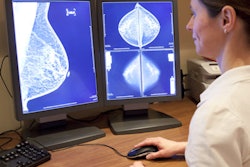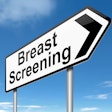As the U.S. celebrates this year's Breast Cancer Awareness Month, radiology experts and advocates reflect on the big year that breast imaging has had.
From the U.S. Food and Drug Administration’s (FDA’s) mandate on breast density notification taking effect to state- and federal-level legislation being introduced and passed for insurance coverage on supplemental imaging, breast imaging is poised to experience transformation soon, the experts said.
“Putting that information and power in the hands of patients is a tremendous step forward,” said Molly Guthrie, vice president of policy and advocacy at Susan G. Komen.
In September, the FDA’s breast density notification mandate took effect. The mandate requires imaging facilities to disclose breast density information to patients receiving breast cancer screening.
Experts say this is a step in the right direction for women with dense breasts to receive effective care and better understand their health. In a previous interview with AuntMinnie.com, JoAnne Pushkin, co-founder of DenseBreast-info.org, said the mandate allows every woman to have the same level of basic information.
“This is actionable information,” Pushkin said in September. “They [women] can do their own research on the topic and engage their providers. They become educated consumers for their own health.”
Guthrie agreed, saying that Komen is “ecstatic” that the FDA moved forward with the mandate. She added that it creates an even playing field for women seeking care for their breast health.
Also, more states have either introduced or passed legislation requiring insurance providers to cover supplemental imaging for women needing follow-up testing. In 2024 alone, the following states passed laws requiring such coverage on supplemental imaging without forcing women to pay out-of-pocket costs: Alaska, Iowa, Louisiana, and New Hampshire. In total, 26 states now have similar laws in effect.
On the federal level, Komen and others are monitoring the progress of two bills: the Find It Early Act, which would provide health coverage with no cost-sharing for additional breast screenings for people at higher breast cancer risk; and the Access to Breast Cancer Diagnosis Act, which would prevent group health plans and insurance providers that offer group or individual coverage from imposing cost-sharing requirements for diagnostic and supplemental breast exams.
The Find It Early Act was introduced to the U.S. Senate but has not been voted on as of October 2. Komen and supporters are strategizing to re-introduce the bill and garner more support when the 119th Congress convenes in 2025, Guthrie said.
The message of Komen and others is evergreen in terms of how women should approach their breast health. But for Breast Cancer Awareness Month, experts say this month is an opportunity to raise focused awareness on breast cancer efforts, the mission to find a cure, and the importance of early detection through screening.
“We can do that by ensuring we are evolving our current technologies in breast cancer detection and notifying patients of their risk and breast composition so they know what tools are available to them so they can make the best-informed decision for themselves and their breast health,” said Amy Patel, MD, from the Breast Care Center at Liberty Hospital in Missouri.
Patel also emphasized the need to be committed to ensuring the utmost quality for patients, both from the radiologist and technologist side.
“This is a month to celebrate our cancer conquerors, as well as those we have lost,” she added. “We have made great strides in our field, but there is much more work to be done to ensure that all patients are being reached, from an educational and most certainly access perspective.”
Guthrie meanwhile pointed to Komen’s online informational tools for women seeking information on breast cancer screening.
“Screening is the best tool that we have for early detection,” she said. “I just really encourage people to feel empowered to have that conversation with their providers about what makes the most sense for them.”



















